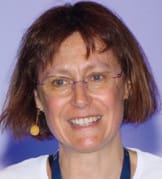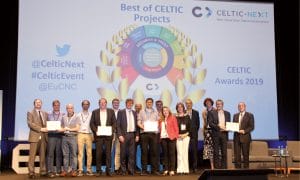How CELTIC-NEXT’s flexibility enables our industry-driven projects to be successful

Valérie Blavette
Orange
blavette(at)celticnext.eu
The ICT landscape is changing rapidly. In order to keep pace, R&D programmes need to adapt to meet the changing needs. In the case of CELTIC-NEXT, I can confidently say that we are up to the challenge, as this year’s successes confirm. At the CELTIC Event in Valencia on 19th June 2019, which was co-located with the EuCNC Event and the Global 5G Event 2019, three projects were awarded for their excellence in the areas of networking technologies (SOOGREEN), applications (E3), and multimedia (4KREPROSYS). The NOTTS project was honoured with the Innovation Award for its outstanding market innovation beyond the project lifespan.
This year has been quite special for our Cluster, as three already awarded CELTIC projects have received in addition EUREKA Awards! In May, SIGMONA was highlighted as EUREKA Global Project of the Year at the EUREKA Global Innovation Summit in Manchester. In September, 4KREPROSYS and E3 each received a EUREKA award at the EUREKA Stakeholder Event in Amsterdam.
These awards for CELTIC projects are the direct consequence of our programme’s flexibility. It allows projects to stay aligned with the quickly evolving technological landscape and the company strategies. CELTIC’s flexibility in combination with the industry-driven character is at the core of our programme. In view of the ongoing initiative for defining the future of Clusters, which has been launched by the current EUREKA chair from the Netherlands, I am convinced that we need to maintain the flexibility and the industry-driven character of our programme in order to stay successful in the future.
The future of Clusters at the EUREKA Stakeholder event
The future of Clusters was a major topic at the EUREKA Stakeholder event in Amsterdam on 4th September. In this context, a central goal was to capture feedback by stakeholders on Clusters and other EUREKA instruments. Representatives from industry and academia shared their views about EUREKA Clusters. In addition, a live survey among the audience on areas of improvement for Clusters was conducted, which showed interesting results. The participants voted that the most essential measures for improving the Cluster programmes should be:
- Increase availability of funding from countries – 41{b28ae05319d94bff0b4d65c5a9f4524dd588360f05c61ef440e1608e0a1c4144} of participants supported this
- Simplify the proposal process – 25{b28ae05319d94bff0b4d65c5a9f4524dd588360f05c61ef440e1608e0a1c4144}
- Have a shorter time to contract – 21{b28ae05319d94bff0b4d65c5a9f4524dd588360f05c61ef440e1608e0a1c4144}
- Higher visibility of EUREKA Cluster programmes – 9{b28ae05319d94bff0b4d65c5a9f4524dd588360f05c61ef440e1608e0a1c4144}
- Create cross-technology / cross-Cluster projects – 5{b28ae05319d94bff0b4d65c5a9f4524dd588360f05c61ef440e1608e0a1c4144}
The major improvement factor identified by the stakeholders – availability of funding from countries – is beyond the scope of any structural change within the Clusters. Concerning the other factors, which are to varying degrees influenceable by Clusters, it should be noted that in the case of CELTIC-NEXT part of the proposal process has already been simplified. We have changed from a two-phase proposal submission to a one-phase submission process, which reduces the required time and effort.
My highlights from the Proposers Day in Istanbul
In order to foster new project submissions, CELTIC-NEXT held a proposer’s day in Istanbul on 25th September. There was a keynote by Hakan Çelik, the R&D Design Chief of ISBAK, about the smart city of Istanbul, which I found particularly interesting.
Mr Çelik explained in his presentation that smart cities are a complex and overarching topic. It includes security, smart mobility, governance, energy, living issues, as well as people and NGOs representing them. According to Mr Çelik, the ultimate goal of smart cities is to improve quality of life and enable better sustainability.
Another highlight was a panel on the business impact of Celtic projects, which was moderated by Işıl Özkan from Turkcell. Representatives of Vestel, Argela, NETAS and ISBAK shared their experiences on the benefits of a number of CELTIC projects in which they were involved, including CONVINCE, TILAS, H2b2Vs, SIGMONA, VIRTUOSE, and COMOSEF. The panellists emphasized the flexibility of CELTIC as a key success factor.
Finally, in the pitching sessions 12 interesting new project ideas were presented, in order to find additional partners for project proposals to be submitted in October or at our spring call next year.
Across the various CELTIC-NEXT Proposers Days in 2019, a total of 52 project pitches were presented, which indicates how attractive our Cluster is to industry and academia in Europe and beyond.

Plans for call on Artificial Intelligence
One of the hottest topics is currently Artificial Intelligence (AI). A number of countries have expressed their interest in a synchronised AI call between CELTIC-NEXT and most of the other EUREKA Clusters. Among the interested countries are Spain, UK, Turkey, Germany, Sweden, Finland, Canada, Denmark, Netherlands, Austria, South Korea, and Hungary as well as the Belgian regions Flanders, Brussels, and Wallonia. Some other countries may join this AI initiative later.
We aim to organise this synchronised AI call in June 2020 in addition to the usual CELTIC-NEXT bottom-up calls. Keep checking our website (www.celticnext.eu)and social media channels for updates.
Conclusion
My first year as CELTIC chairperson has been exciting. It has shown me that it is important for our programme to embrace change. And it has shown me at the same time how important it is to adhere to the key principles of CELTIC – flexibility and the industry-driven character of our programme. Based on this, I am confident that CELTIC will continue to thrive in a changing landscape. And as this year’s inter-Cluster spokesperson I may add that EUREKA Clusters as a whole will keep playing an important role in generating value for industry and citizens in Europe and beyond.
The ICT landscape is changing rapidly. In order to keep pace, R&D programmes need to adapt to meet the changing needs. In the case of CELTIC-NEXT, I can confidently say that we are up to the challenge, as this year’s successes confirm. At the CELTIC Event in Valencia on 19th June 2019, which was co-located with the EuCNC Event and the Global 5G Event 2019, three projects were awarded for their excellence in the areas of networking technologies (SOOGREEN), applications (E3), and multimedia (4KREPROSYS). The NOTTS project was honoured with the Innovation Award for its outstanding market innovation beyond the project lifespan.
This year has been quite special for our Cluster, as three already awarded CELTIC projects have received in addition EUREKA Awards! In May, SIGMONA was highlighted as EUREKA Global Project of the Year at the EUREKA Global Innovation Summit in Manchester. In September, 4KREPROSYS and E3 each received a EUREKA award at the EUREKA Stakeholder Event in Amsterdam.
These awards for CELTIC projects are the direct consequence of our programme’s flexibility. It allows projects to stay aligned with the quickly evolving technological landscape and the company strategies. CELTIC’s flexibility in combination with the industry-driven character is at the core of our programme. In view of the ongoing initiative for defining the future of Clusters, which has been launched by the current EUREKA chair from the Netherlands, I am convinced that we need to maintain the flexibility and the industry-driven character of our programme in order to stay successful in the future.